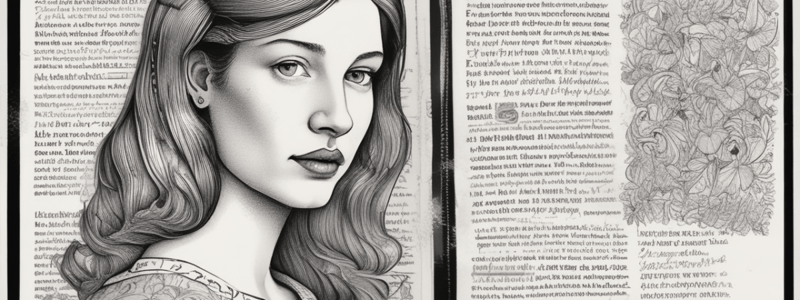Podcast
Questions and Answers
What literary device is used to showcase adulation for the new child?
What literary device is used to showcase adulation for the new child?
- Metaphor
- Simile (correct)
- Alliteration
- Personification
What does the poem 'Morning Song' explore besides the celebration of Frieda's birth?
What does the poem 'Morning Song' explore besides the celebration of Frieda's birth?
- The theme of old age and death
- The theme of womanhood and motherhood (correct)
- The theme of friendship and love
- The theme of war and violence
What is the central theme underlying the poem?
What is the central theme underlying the poem?
- The fleeting nature of youth
- The power of maternal instinct
- The speaker's struggle with her own identity (correct)
- The challenges of motherhood
What does the 'moth-breath' imagery in the poem convey?
What does the 'moth-breath' imagery in the poem convey?
What is the significance of the 'flat pink roses' in the poem?
What is the significance of the 'flat pink roses' in the poem?
What does the speaker's self-depiction in the 'Victorian nightgown' convey?
What does the speaker's self-depiction in the 'Victorian nightgown' convey?
Flashcards
Morning Song Themes
Morning Song Themes
Poem explores parental joy and anxiety, evolving maternal identity, challenges of womanhood, and the impact of a new baby.
Figurative Language (Plath)
Figurative Language (Plath)
Plath uses similes, metaphors, and conceits to create vivid imagery and explore complex feelings.
Tercets
Tercets
Each stanza has three lines.
Caesura
Caesura
Signup and view all the flashcards
"Love set you going like a fat gold watch"
"Love set you going like a fat gold watch"
Signup and view all the flashcards
"Our voices echo, magnifying your arrival. New statue."
"Our voices echo, magnifying your arrival. New statue."
Signup and view all the flashcards
"I'm no more your mother Than the cloud that distills a mirror to reflect its own slow Effacement at the wind's hand."
"I'm no more your mother Than the cloud that distills a mirror to reflect its own slow Effacement at the wind's hand."
Signup and view all the flashcards
Imagery (Morning Song)
Imagery (Morning Song)
Signup and view all the flashcards
Poem Structure (Morning Song)
Poem Structure (Morning Song)
Signup and view all the flashcards
Study Notes
Morning Song by Sylvia Plath
Themes and Ideas
- Celebration of Frieda's birth and the effect of a child's birth on parents
- Maternal love and womanhood
- Feminine identity and insecurity
- Consideration of new life and identity changes
Style
- Expert use of figurative language (simile, metaphor, conceit)
- Every stanza is a tercet (three lines)
- Carefully placed caesura for reflection
- Imagery (auditory, visual, kinesthetic)
Key Quotes and Analysis
- "Love set you going like a fat gold watch" - Original painterly simile, warm and inclusive sentiment
- "Our voices echo, magnifying your arrival. New statue." - Comparing the baby to a "new statue", reverential parents, anxiety
- "I'm no more your mother Than the cloud that distills a mirror to reflect its own slow Effacement at the wind's hand." - Profound conceit, theme of identity change, "effacement" of old self
- "All night your moth-breath Flickers among the flat pink roses." - Maternal instinct, kinesthetic imagery, delicacy
- "One cry, and I stumble from bed, cow-heavy and floral In my Victorian nightgown." - Honest self-depiction, candid maternal image
- "Whitens and swallows its dull stars. And now you try Your handful of notes;" - Euphonic assonance, love for daughter, gifting a joyous start to womanhood
Morning Song by Sylvia Plath
Themes and Ideas
- Celebration of Frieda's birth and the effect of a child's birth on parents
- Maternal love and womanhood
- Feminine identity and insecurity
- Consideration of new life and identity changes
Style
- Expert use of figurative language (simile, metaphor, conceit)
- Every stanza is a tercet (three lines)
- Carefully placed caesura for reflection
- Imagery (auditory, visual, kinesthetic)
Key Quotes and Analysis
- "Love set you going like a fat gold watch" - Original painterly simile, warm and inclusive sentiment
- "Our voices echo, magnifying your arrival. New statue." - Comparing the baby to a "new statue", reverential parents, anxiety
- "I'm no more your mother Than the cloud that distills a mirror to reflect its own slow Effacement at the wind's hand." - Profound conceit, theme of identity change, "effacement" of old self
- "All night your moth-breath Flickers among the flat pink roses." - Maternal instinct, kinesthetic imagery, delicacy
- "One cry, and I stumble from bed, cow-heavy and floral In my Victorian nightgown." - Honest self-depiction, candid maternal image
- "Whitens and swallows its dull stars. And now you try Your handful of notes;" - Euphonic assonance, love for daughter, gifting a joyous start to womanhood
Studying That Suits You
Use AI to generate personalized quizzes and flashcards to suit your learning preferences.




